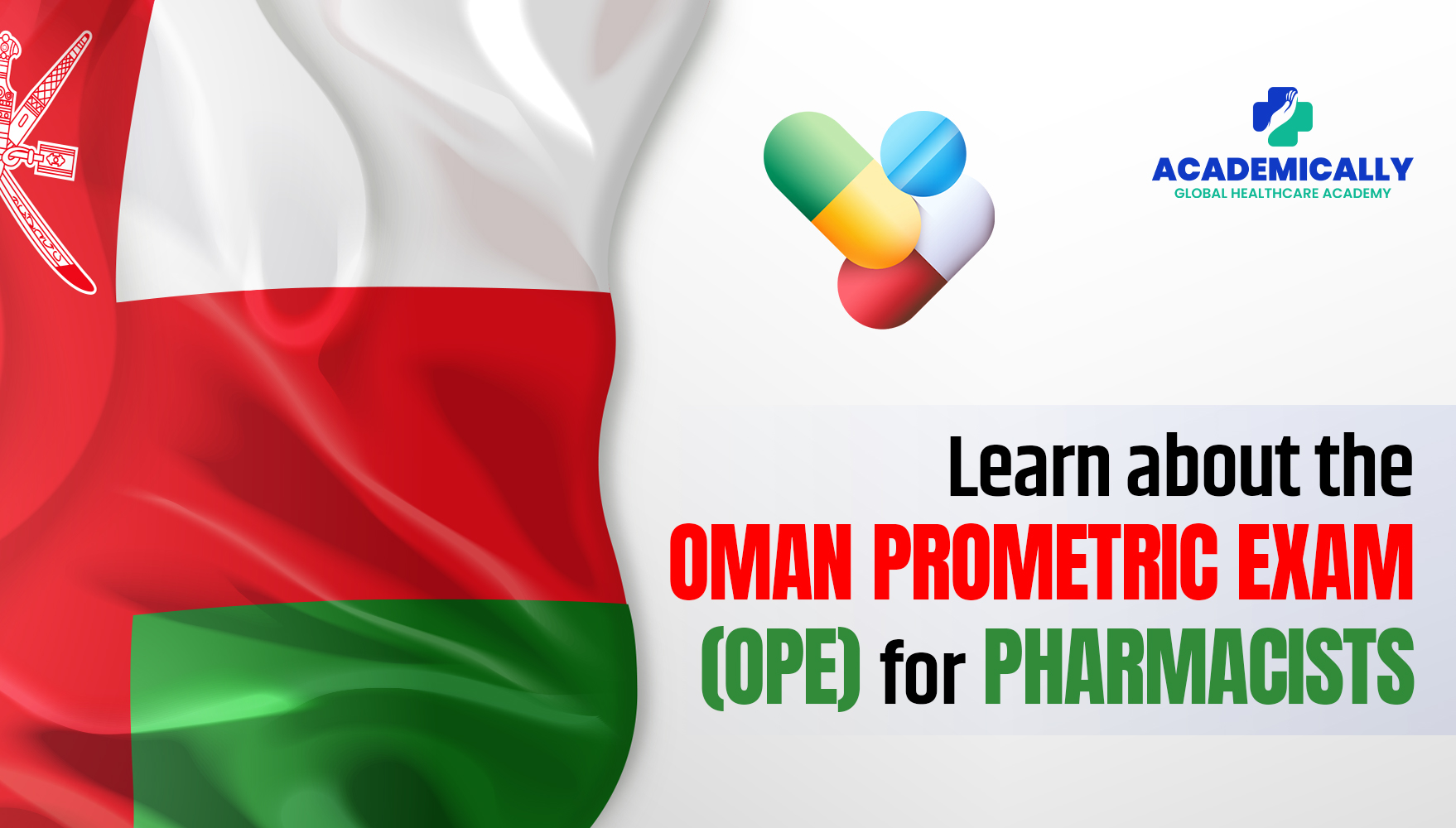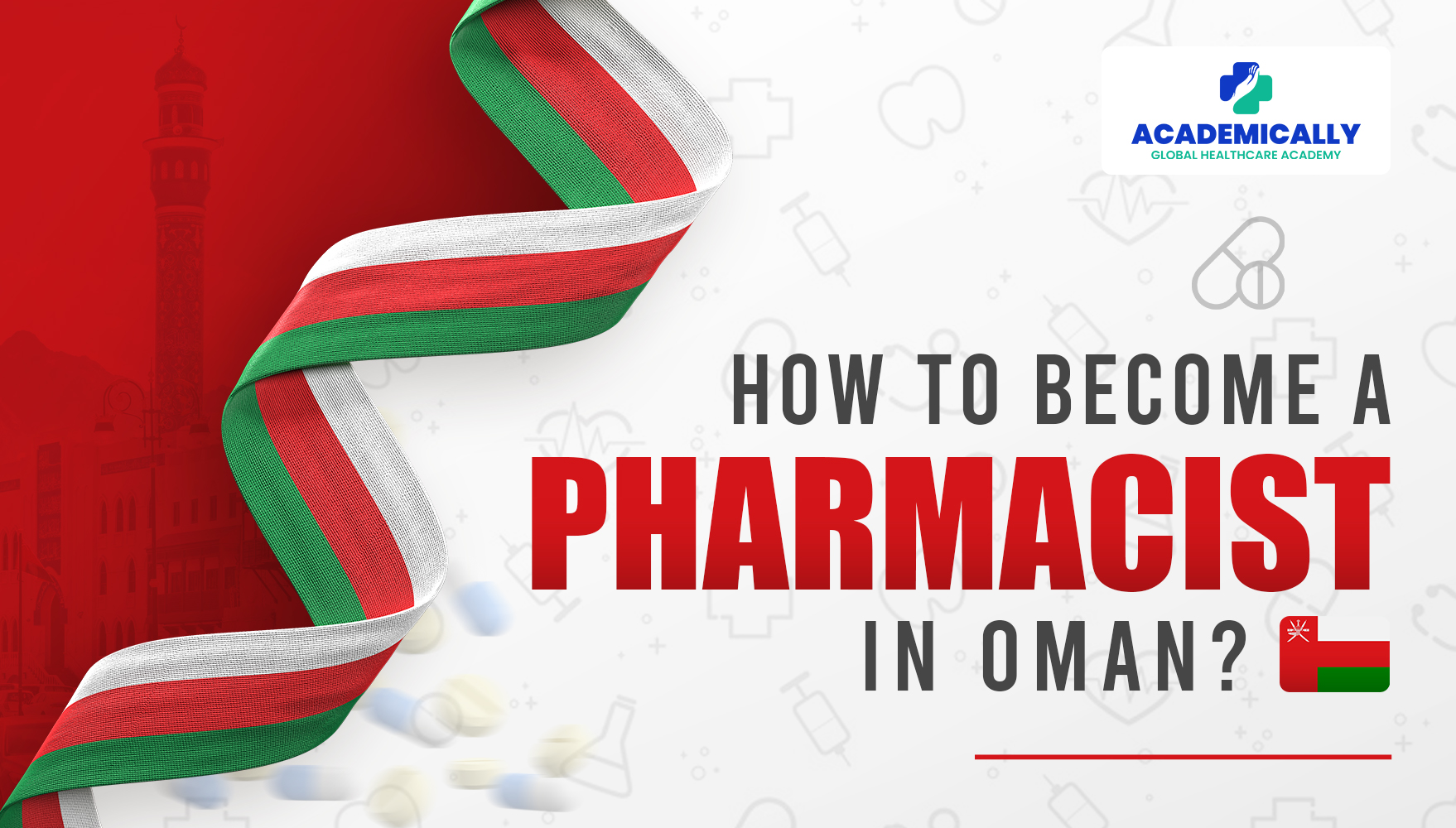What Is the Oman Prometric Exam (OPE)?
The Oman Prometric Exam (OPE) is a requirement for pharmacists who wish to work in Oman. It tests your knowledge and competence across different pharmacy subjects. Passing this exam is complusory.
Total Components of the Oman Prometric Exam:
- Sessions: 1 session
- Format: Multiple Choice Questions (MCQs)
- Number of Questions: 100
- Time Duration: 2.5 hours
- Passing Score: 60%
To pass, you’ll need to score at least 60%, which means answering 60 questions correctly. With 2.5 hours to complete the 100 questions, time management is really required. Now, let's look at the core subjects tested in the exam.
Core Subjects Covered in the Oman Prometric Exam
The OPE evaluates knowledge across six key pharmacy areas, designed to cover every aspect of pharmaceutical practice:
- Social/Behavioral/Administrative Sciences
- This section assesses your understanding of healthcare systems, pharmacy management, and the skills necessary for interacting effectively with patients.
- Topics include healthcare policies, pharmacy operations, budgeting, and patient communication. You may also be asked questions on the role of pharmacists within the healthcare system, along with economic and social factors impacting patient care.
- Pharmaceutical Calculations & Compounding
- Accurate drug dosage calculations and knowledge of compounding are critical skills for pharmacists.
- Expect questions about conversions, dose adjustments, IV flow rate calculations, and sterile and non-sterile compounding techniques. This section tests your ability to prepare medications tailored to specific patient needs.
- Pharmaceutical Sciences
- Pharmaceutical Sciences covers the fundamental knowledge needed to understand drug properties and actions.
- Topics include pharmacokinetics, pharmacodynamics, medicinal chemistry, and the mechanism of drug actions. This area ensures you have a solid grasp of how drugs work at the chemical and molecular levels.
- Clinical Sciences
- Clinical Sciences focuses on the practical application of pharmaceutical knowledge in clinical settings.
- You'll be tested on pharmacotherapy, adverse drug reactions, clinical pharmacology, and patient safety protocols. This section is crucial as it evaluates your ability to use medications safely and effectively to treat various health conditions.
- Pharmaceutical Care & Disease Management
- This area emphasises the role of pharmacists in managing patient health and creating personalised care plans.
- Topics include developing care plans, managing chronic conditions, and evaluating the effectiveness of therapy. Questions often centre around disease prevention, treatment strategies, and assessing patient outcomes.
- Basic Biomedical Sciences
- To work in pharmacy, you need a good understanding of the body and how it reacts to medicine. This part of the test covers basic subjects like how our bodies work (anatomy and physiology), the chemical processes inside us (biochemistry), and how tiny organisms like bacteria affect us (microbiology). It checks that you understand how the body works and how medications will impact it, so you can make safe treatment choices.
Each of these areas contributes to your overall score, so it’s necessary to allocate study time based on your strengths and areas for improvement.
How to Prepare for the Oman Prometric Exam
Passing the OPE is a huge step in your pharmacy career, so good preparation is really important. Here are some tips to help you do well:
Create a Study Schedule
- Plan your study time by setting aside specific hours for each subject. If you’re not as confident in areas likePharmaceutical Calculations & Compounding, spend a bit more time on those to feel more prepared.
Use Quality Study Resources
- Use textbooks, review guides, and online courses tailored to the Prometric exam syllabus. Consider resources specifically designed for pharmaceutical exams, which will focus on the core subjects required for the test.
Practice with MCQs
- Since the exam consists of multiple-choice questions, practising MCQs is essential. This will help you get used to the exam format, improve your speed, and most importanly test your knowledge. Many online resources offer MCQ practice questions especially for pharmaceutical subjects.
Focus on Time Management:
- With 100 questions and just 2.5 hours to finish, dividing your time well is extremly important. When you practice, set a timer and challenge yourself to answer each question in 90 seconds. This will help you get used to the time pressure and keep a good pace on exam day.
Review Case Studies and Real-Life Scenarios
- The OPE doesn’t just test theory; it also examines how you apply knowledge in practical scenarios. Reviewing case studies can help you understand the application of pharmaceutical care in real-world situations, especially for the Clinical Sciences and Disease Management sections.
Stay Updated on Omani Healthcare Policies
- Since some questions relate to healthcare systems and policies, familiarise yourself with Oman’s healthcare framework and policies. This is mainly important for the Social/Behavioral/Administrative Sciences section.
Exam Day Tips for the OPE
On exam day, your main goal should be to stay focused and manage your time well. Here are some last-minute tips:
- Arrive Early: Aim to reach the test centre at least 30 minutes early to avoid any last-minute stress.
- Bring Necessary Identification: Make sure to have your ID and any other required documents.
- Read Questions Carefully: Take your time to read each question properly before finally choosing an answer. Sometimes, a subtle detail can change the meaning of the question. So do not hurry while reading the questions.
- Skip and Return: If you’re stuck on a question, skip it and return to it later. This strategy can help you maximise your time and avoid getting depressed or side-tracked by tough questions.
What to Expect After the Exam
Once you’ve completed the OPE, your results will be available after a short waiting period. If you pass, you can move on to apply for licensure, allowing you to begin your career as a pharmacist in Oman. If you don’t pass on the first attempt, remember that you can take the exam again after preparing more.
Conclusion: Your Path to Practising Pharmacy in Oman
The Oman Prometric Exam is required for working as a licensed pharmacist in Oman. It may seem challenging at first, but with a clear understanding of the exam pattern, a proper study plan, and constant practice, you can surely pass the test.
Remember, passing the OPE is not just about meeting the required score—it’s about building the knowledge and skills to make a positive impact in Omani healthcare.
Good luck on your journey, and don’t hesitate to reach out for guidance if you need help along the way.






